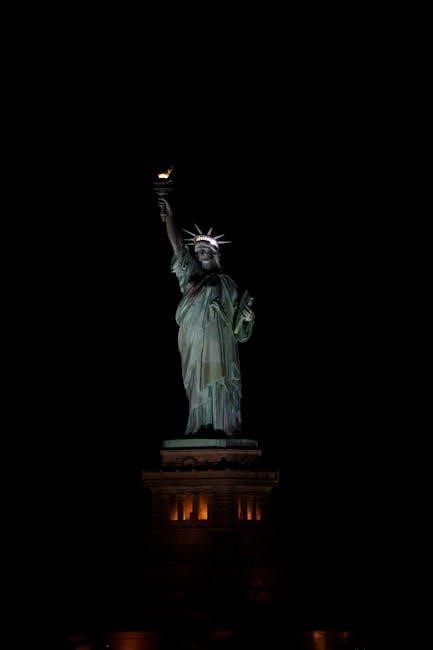The Secret History, Donna Tartt’s 1992 debut novel, is a gripping tale of morality, guilt, and elite academia. Its dark, intricate plot and complex characters captivate readers globally, making it a modern classic. The book’s themes of privilege and consequences resonate deeply, while its availability in PDF format has expanded its reach, though legal downloads are advised to support the author’s work.
Overview of the Novel
The Secret History, Donna Tartt’s debut novel, explores the dark dynamics of a group of elite college students who commit a murder. Set in New England, the story delves into themes of privilege, morality, and guilt, captivating readers with its intricate plot and complex characters. The novel’s popularity has led to its availability in PDF format, making it accessible to a wider audience while sparking discussions about the legal and ethical aspects of digital book sharing.
Author Background: Donna Tartt
Donna Tartt is a celebrated American author known for her literary prowess and meticulous storytelling. Born on December 23, 1963, in Grenada, Mississippi, Tartt gained recognition with her debut novel, The Secret History, in 1992. Her works are renowned for their depth, complex characters, and exploration of morality. With novels like The Little Friend and The Goldfinch, Tartt has solidified her reputation as a master of contemporary literature, blending dark academia with profound human insights.
Plot and Themes
The Secret History unfolds as a campus novel, exploring the dark events surrounding a group of college students entangled in a murder. Themes of morality, guilt, and the dangers of elite culture are central, delving into the psychological depths of its characters and the consequences of their actions.
The Storyline and Main Characters
The Secret History follows Richard Papen, a young man from California who enrolls in an elite New England college. He becomes infatuated with a group of eccentric classics students, including Charles, Camilla, Francis, and Bunny. The group’s intellectual obsessions and isolated lifestyle lead to a tragic event: the murder of Bunny, which they attempt to cover up. The novel explores their complex relationships, psychological unraveling, and the moral consequences of their actions, all narrated by Richard years after the events unfold.
Themes of Morality, Guilt, and Elite Culture
The Secret History delves into the complexities of morality and guilt, exploring how privilege and isolation can lead to moral decay. The novel critiques elite academic culture, portraying a group of students who believe themselves above societal norms. Their actions, driven by intellectual arrogance and a desire for exclusivity, result in a tragic murder. The book examines the psychological consequences of their choices, highlighting the tension between refined ideals and darker human impulses, ultimately revealing the devastating cost of unchecked ambition.
The Significance of the “Secret History” Concept
The “secret history” concept reveals hidden truths, whether in Donna Tartt’s novel about elite academia or historical texts like The Secret History of the Mongols, shaping our perception of power and cultural dynamics.
Historical Context of the Term “Secret History”
The term “secret history” originates from ancient and medieval texts that uncovered hidden truths or alternative narratives. For instance, The Secret History of the Mongols provides an intimate, unauthorized account of Genghis Khan’s life and empire, contrasting with official records. Similarly, Donna Tartt’s novel uses the concept to explore concealed events within an elite group, reflecting the timeless appeal of uncovering suppressed stories.
Historically, such works often challenged official narratives, offering deeper insights into power, culture, and human nature. This tradition continues in modern literature, where “secret histories” reveal the complexities of privilege and morality.
Modern Interpretations in Literature
Donna Tartt’s The Secret History is a prime example of modern literature embracing the “secret history” concept. The novel’s exploration of elite academia, moral decay, and hidden truths resonates with contemporary themes of privilege and guilt. Its dark, atmospheric style has influenced the “dark academia” genre, while its psychological depth continues to captivate readers. The book’s availability in PDF format has further amplified its reach, making it a cornerstone of modern literary discussion and debate.
Availability of “The Secret History” in PDF Format
The Secret History by Donna Tartt is widely available in PDF format, with platforms like Z-Library and OceanofPDF offering free downloads. This accessibility has made the novel a staple in dark academia circles, ensuring its enduring popularity among readers seeking literary classics in digital formats.
Free PDF Downloads and Legal Considerations
While free PDF downloads of The Secret History are available on platforms like Z-Library and OceanofPDF, they often infringe on copyright laws. Readers are encouraged to support authors by purchasing official copies. Legal downloads ensure quality and contribute to the literary ecosystem, while unauthorized versions may lack proper formatting or contain errors. Despite this, the ease of access has fueled the novel’s popularity, making it a staple in dark academia and mystery genres.
Popular Platforms for PDF Access
The Secret History in PDF format is widely accessible through platforms like Z-Library and OceanofPDF, which offer free downloads. These sites are popular among readers due to their vast collections and user-friendly interfaces. Additionally, platforms like Royallib.com provide the book in various formats, including PDF, appealing to a global audience. These platforms have made the novel more accessible, contributing to its widespread popularity and enduring appeal among fans of dark academia and literary fiction.
Reception and Reviews
The Secret History has received widespread acclaim for its dark, gripping narrative and exploration of morality. Readers praise its intricate characters and atmospheric storytelling, solidifying its status as a modern literary masterpiece.
Critical Acclaim and Controversies
The Secret History has garnered significant critical acclaim for its intricate narrative and profound exploration of human morality. Critics praise its rich, atmospheric storytelling and complex characters, making it a literary masterpiece. However, its graphic violence and morally ambiguous themes have sparked controversy. Despite debates, the novel remains a cornerstone of contemporary literature, continuing to captivate readers with its dark, thought-provoking content.
Reader Responses and Fan Base
The Secret History has captivated readers with its dark academia theme and moral complexity, fostering a loyal fan base. Many praise its thought-provoking narrative, while others connect emotionally with its flawed characters. The novel’s ability to explore the depths of human psyche resonates deeply, making it a favorite among book clubs and literary circles. Its popularity endures, with readers often seeking PDF versions to revisit its haunting story and share it widely online.

Historical and Cultural References
The Secret History of the Mongols and classical literature influences are woven into Donna Tartt’s work, blending historical depth with modern storytelling to enrich its cultural narrative.
Influence of Classical Literature
The Secret History draws deeply from classical literature, with its characters shaped by ancient Greek and Roman texts. Their obsession with these works influences their worldview and actions, often leading to tragic consequences. The novel mirrors classical themes of hubris, fate, and moral decay, creating a haunting parallel between ancient myths and modern academia. This interplay enriches the narrative, illustrating how timeless literary themes continue to resonate in contemporary settings.
Connections to Dark Academia
The Secret History is a cornerstone of the dark academia genre, exploring themes of obsession, elitism, and the dangers of unchecked intellectual pursuits. The novel’s focus on a secretive group of students enamored with classical knowledge resonates deeply with the genre’s aesthetic. Its portrayal of a stifling, exclusive academic environment and the tragic consequences of their actions has cemented its place as a defining work in dark academia, influencing countless adaptations and inspiring a devoted fan base.

The Author’s Writing Style
Donna Tartt’s writing style is renowned for its dense, atmospheric prose and intricate narratives. Her vivid descriptions and psychological depth create a haunting, immersive experience.
Donna Tartt’s Narrative Techniques
Donna Tartt’s narrative style in The Secret History is characterized by a rich, atmospheric prose that immerses readers in the story. Her use of a first-person narrative, through Richard Papen’s reflective recounting, creates a sense of intimacy and immediacy. Tartt employs a slow-burning tension, gradually unraveling the mystery while exploring the psychological depths of her characters. The intricate details and layered storytelling enhance the novel’s suspense, making her technique both engaging and thought-provoking.
Symbolism and Character Development
In The Secret History, Donna Tartt masterfully weaves symbolism through her characters and setting. The group’s obsession with classical ideals symbolizes their detachment from reality, while their actions mirror tragic Greek dramas. Richard’s journey from outsider to insider reflects the corrupting influence of privilege. The novel’s dark academia setting serves as a metaphor for isolation and moral decay. Tartt’s deep exploration of guilt, redemption, and the duality of human nature enriches the narrative, making her characters both flawed and profoundly relatable.

Adaptations and Related Works
The Secret History has sparked interest in adaptations, with discussions about potential film or TV series. Its influence extends to related historical texts, like The Secret History of the Mongols, offering diverse literary connections.
Potential Film or TV Adaptations
The Secret History has long been a subject of interest for film and TV adaptations, with discussions among fans and studios about its potential on screen. The novel’s dark academia theme and intricate characters make it a compelling candidate for a series or movie. While no official adaptation has been announced, its atmospheric and complex narrative continues to inspire speculation. Fans envision a faithful interpretation that captures the book’s haunting essence, potentially introducing it to a broader audience.
Similar Books and Recommendations
The Secret History fans often explore other works in the dark academia genre. Titles like If We Were Villains by M.L. Rio and The Name of the Rose by Umberto Eco offer similar themes of mystery, morality, and elite settings. These books delve into psychological depth and complex characters, appealing to readers who enjoy atmospheric, thought-provoking narratives. For those captivated by Tartt’s style, these recommendations provide a comparable reading experience, blending intellectual intrigue with haunting storytelling.

The Secret History of the Mongols
The Secret History of the Mongols is an ancient text detailing Chinggis Khan’s rise, offering insights into empire-building and cultural dynamics, influencing themes in historical literature.
Historical Texts and Their Relevance
The Secret History of the Mongols is a foundational text chronicling the rise of Genghis Khan and the Mongol Empire, offering unparalleled insights into their culture, conquests, and legacy. As a primary historical source, it remains vital for understanding medieval Asian and world history. Its detailed accounts of tribal dynamics, leadership, and empire-building provide a rich context for studying power structures and societal evolution. The text’s relevance extends to literature, influencing themes of authority and transformation, as seen in works like Donna Tartt’s The Secret History.
Comparisons with Donna Tartt’s Work
The Secret History of the Mongols and Donna Tartt’s The Secret History share themes of power, consequence, and the complexities of human nature. While Tartt’s novel explores elite academia and moral decay, the Mongol text delves into empire-building and tribal dynamics; Both works examine the darker aspects of leadership and the enduring impact of actions. Their narratives, though vastly different in context, offer profound insights into the human condition, making them timeless and thought-provoking in their respective genres.
The Secret History remains a timeless, haunting exploration of human nature and morality. Its availability in PDF has widened its audience, ensuring its legacy endures.
Final Thoughts on the Book’s Impact
The Secret History leaves a profound and lasting impression, challenging readers to reflect on morality, guilt, and the consequences of elite isolation. Its haunting narrative and complex characters resonate deeply, making it a timeless exploration of human darkness. The book’s themes of privilege and moral decay continue to captivate audiences, solidifying its place as a modern literary masterpiece. Its influence on dark academia and psychological fiction remains unparalleled, ensuring its enduring relevance in contemporary literature.
Encouragement to Read the Full Work
The Secret History is a masterful exploration of human nature, morality, and the consequences of unchecked ambition. Its intricate plot and deeply flawed characters offer a compelling narrative that lingers long after the final page. For those drawn to dark academia and psychological depth, this novel is essential reading. While PDF versions are widely available, experiencing the full, uninterrupted work is crucial to fully grasp its complexity and emotional resonance. Immerse yourself in this haunting tale to uncover its profound insights into the human condition.
